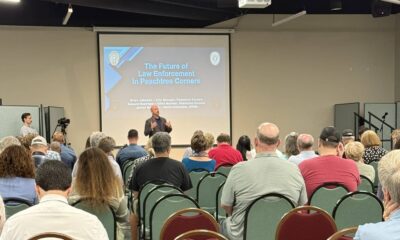City Government
Peachtree Corners Adopts New Plan for the Central Business District
Published
5 months agoon
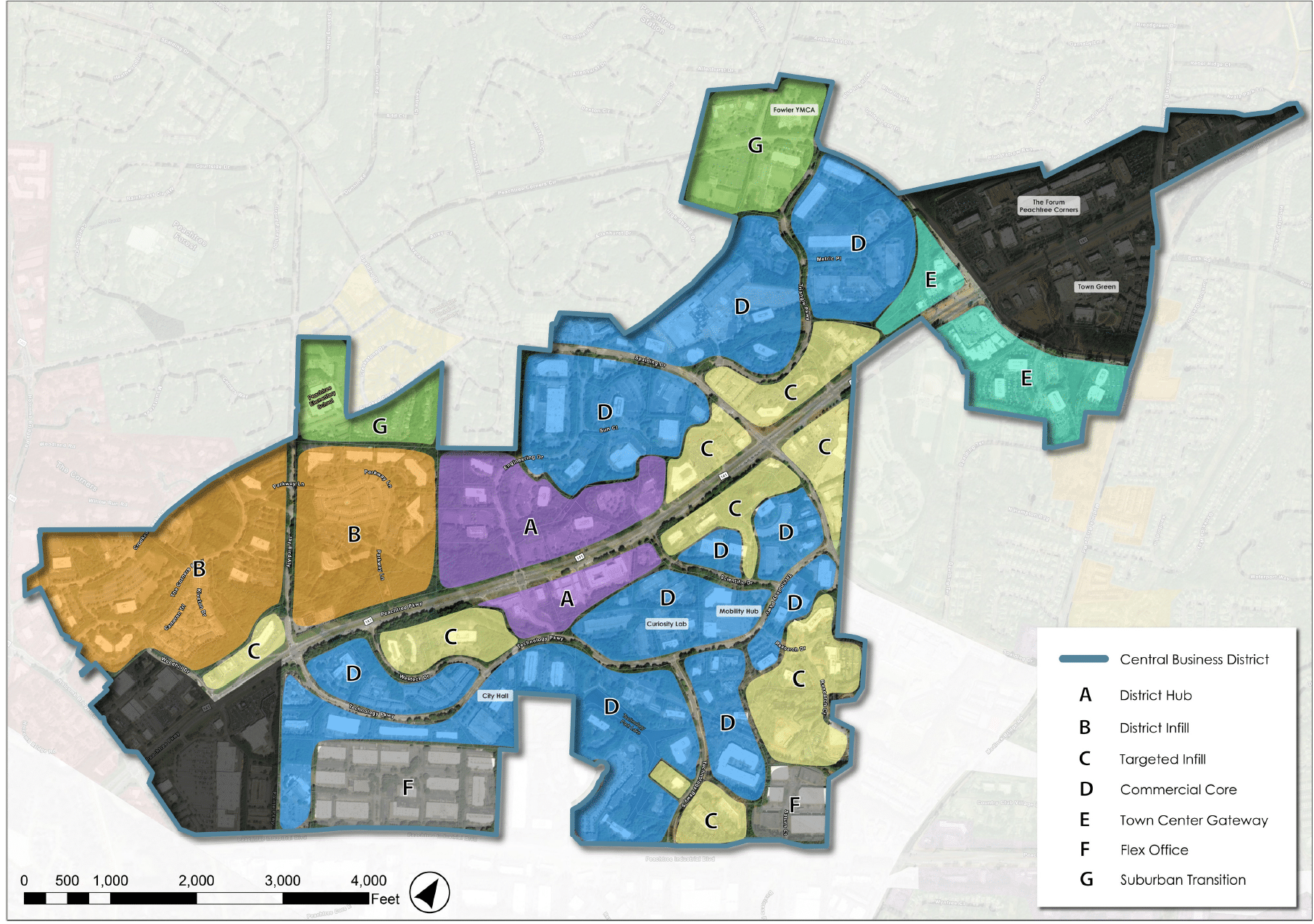
On May 3, the City of Peachtree Corners put in place a moratorium on development in the central business district.
“One of the reasons that led to that is we were starting to see, from the marketplace, a lot of properties in our central business district come online for sale,” said Community Development Director Shaun Adams during the Peachtree Corners Life podcast with Southwest Gwinnett magazine publisher Rico Figliolini.
“[Developers] were looking to redevelop sites in a way that didn’t necessarily align with what we felt our long-term vision of the central business district was. And when you look at the central business district, it’s a big piece of all of our office parks, including Tech Park and some of our retail nodes.”

Adams added that having one policy that covered the entire area was broader than what the city wanted.
“We pressed pause,” he said, “and started working on a small area plan.”
The planning commission made recommendations on November 12, and the city council voted unanimously to adopt it on December 17.
Key points and concerns
The city’s small area plan focuses on the central business district. Key points included:
- A daytime population of nearly 20,000 versus 2,400 residents — highlighting commuter traffic.
- An asset inventory identified high vacancy and underutilized spaces.
- Seven sub-areas were outlined: district hub, district infill, targeted infill, commercial core, Town Center gateway, flex office and suburban transition.
- Concerns were raised about high-density development in the Town Center gateway area, citing traffic volume and safety issues.
Throughout the process, there were focus groups with brokers and office owners in the central business district. The final plan emphasizes the need for granular development guidelines and community feedback.
“We had a public engagement meeting. I’ve had some one-on-one conversations with members of the public who have reached out to me as well and provided feedback,” said Adams. “As a byproduct of that, we had a couple of themes that came out of those engagement sessions that spoke to more placemaking opportunities or amenitizing the Tech Park/central business district area, taking it from an eight-hour day to a sixteen-hour day type of thought process, [adding] more gathering space where we could and a better mix of housing stock within the area.”
The asset assessment
The city did an “asset inventory” looking at every commercial building in the central business district.
“We did a market analysis as well, to determine how they were from a condition standpoint, what their occupancy rates were, what’s on the market, what’s not [and] what properties have more underutilized space or parking than others,” said Adams.
“And as a byproduct of that, we’ve … set out these seven sub-areas — which is probably the biggest change in the small area plan — within the sub-district that allows us to get a little more granular and look at each of these areas and say, okay, what may make sense from a redevelopment standpoint or development standpoint in one area may not make sense in another.”
As an addendum to the 2045 comprehensive plan, the changes go into effect immediately.
“It is a policy document. It’s not a law document,” said Adams. “The comprehensive plan is meant to guide our 10-to-20-year vision of how we see the city progressing.”
The new plan
“One of the sections that is in the central business district, I didn’t even realize, was the G section [at the] intersection of Peachtree Corners Circle and West Jones Bridge Road and Crooked Creek,” said Figliolini. “I didn’t even realize that was in the central business district area.”
Adams and Figliolini went through the map.
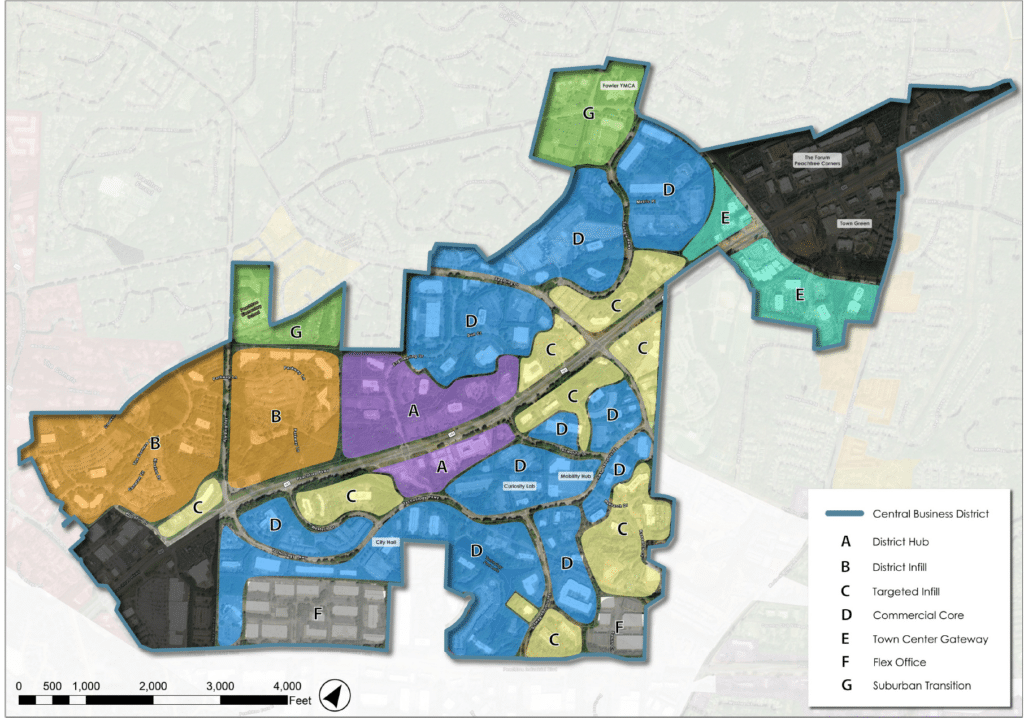
“I think the reason why [this area is] included is because they are mostly institutional uses, which tend to lean on the commercial side versus everything around it being residential,” said Adams.
He explained that the previous policy was too broad for the entire area.
“We identified and understood that what may be appropriate along 141 and sub-area A probably isn’t appropriate in G. And so, we wanted to try to carve that out for a couple of reasons,” he said. “One is for the community to understand that we recognize there’s a difference in what might be able to go there, but also for developers to know that, while it’s in the central business district, athletic fields probably aren’t the place for an intense development.”
That’s why area G has been singled out, Adams added.
“It will maintain its existing institutional character with the schools and the churches and the YMCA there to the extent that if it were to be redeveloped in the future, it needs to take on the low-intensity residential character of all the residential around it,” he said. “And so, if anything, it should act more like … Amberfield and Peachtree Station and everything that’s right by it and less like [the] central business district.”
Retail and entertainment
The darkened areas of the map — The Forum, Town Center and Dick’s Sporting Goods on the south end, along with the Chick-fil-A — are really the retail entertainment sections.
“It really isn’t the same as the rest of the central business district, which is office focused,” said Adams.
He added that Town Center and The Forum are either in the process of or already built out. There’s not a lot of potential for change.
With updates coming to the comprehensive plan about every five years, Adams added that development will evolve with the city’s needs.
“To me, the biggest change is what the sub-areas are allowing us to do, other than stating that we’ve got a couple of zoning districts in the works as a byproduct of this, so that we can fully implement the plan,” said Adams.
“We do have two applications in for December [for the] planning commission, but they’re not really specific to these changes. So, we haven’t had that rush — even though the moratorium ended on November 3 — of people coming in.”
He added, “It’ll be interesting, as people maybe flip their heads out of the sand after the holidays in January and start to kick tires again, to kind of see the reaction of the development community the first couple of times they come in on some of these properties and talk with us about it.”
To read the Central Business District Small Area Study, click here.
Related
Arlinda Smith Broady is part of the Boomerang Generation of Blacks that moved back to the South after their ancestors moved North. With approximately three decades of journalism experience (she doesn't look it), she's worked in tiny, minority-based newsrooms to major metropolitans. At every endeavor she brings professionalism, passion, pluck, and the desire to spread the news to the people.

City Government
Peachtree Corners Hosts Discussion About the Future of Local Policing
Published
1 day agoon
May 12, 2025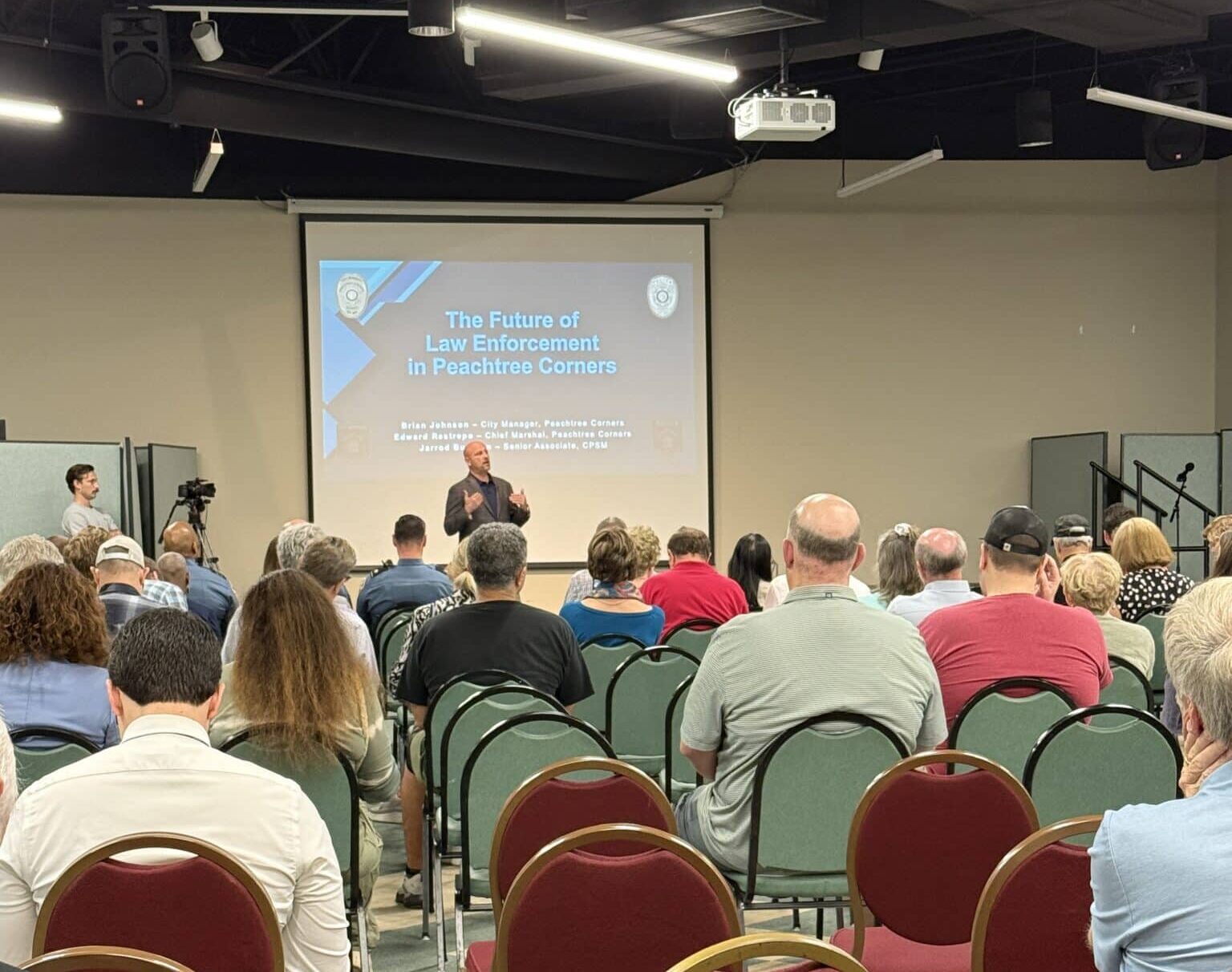
Although crime isn’t on the rise, and the Gwinnett County Police Department (GCPD) is fulfilling its role in fighting crime, the City of Peachtree Corners is asking residents, business owners and city stakeholders if they believe the city should form its own police department.
With close to 200 people in attendance, City Manager Brian Johnson led the discussion about the future of policing in Peachtree Corners. He presented the findings from a survey conducted by the Center for Public Safety Management (CPSM), a nationally-recognized law enforcement consulting and training firm, as well as information about patrol officer staffing, response times, costs to tax payers and a potential timeline.
Ensuring public safety
Johnson kicked off his presentation by explaining that it is the duty of the mayor and city council to ensure public safety, including reviewing law enforcement.
“Maybe it needs to grow, maybe it needs to change its focus. But city council is the one that has the decision-making responsibility,” he said.
He was also adamant that this isn’t a done deal.

“I hit this point already, but I want to hit it again. This is the start of a conversation, a community conversation and feedback to council. There hasn’t been a decision,” he said. “Council has not received this presentation from me. They’re here to watch and learn from your feedback of this.”
Mayor Mike Mason was present at the meeting, along with all of the city council members except Eric Christ who was out of town and watching remotely.
Issues and obstacles
Johnson explained that the grounds for the inquiry were based on issues about communication, access to information and enforcement of city-specific ordinances. He cited an example where a city rule that private residences can’t be rented on a short-term basis like Vrbo or Airbnb wasn’t enforced by GCPD. An owner tried to circumvent the ordinance by only renting the outside of the house. A loud pool party ensued, and frustrated neighbors dialed 911.
“Officers showed up and they said, ‘We can’t enforce the city’s noise ordinance,’” Johnson said.
The first stage to fix this problem was creating the marshal program to bridge the gap between code enforcement and GCPD.
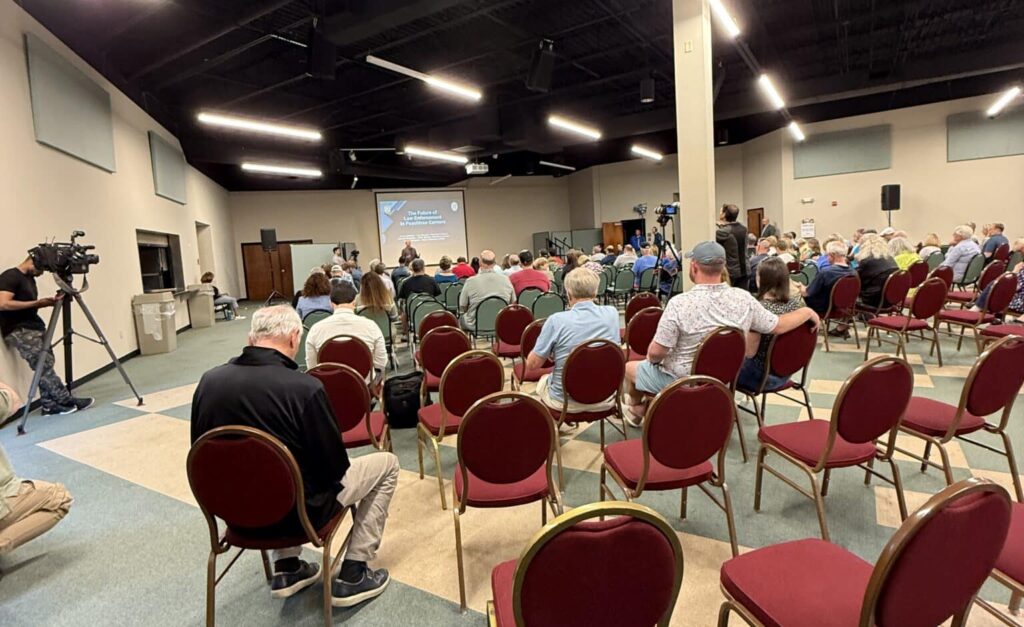
“[We thought] they would be able to enforce both local ordinance and state law, since they are a function of the city, and they could maybe be a force multiplier for Gwinnett since [marshals] don’t have to respond to 911 calls,” said Johnson.
But other issues arose shortly after the department was formed.
“We were still working towards getting that good balance, but we have been faced recently with a couple of things that make it harder for us,” said Johnson.
Seeking shared access
Instead of GCPD giving PTC marshals read-only, quick access to incident reports, dispatch calls and other information, the marshals department was required to file open records requests through the same process as any civilian.
“They were denied, as well as the city of Sugar Hill, [when] asked for the ability to see, not change, but see the computer-aided dispatch information, so that they would know where Gwinnett County police officers were; so that they could avoid stepping on their toes or maybe looking to support their efforts, and they haven’t been granted that,” said Johnson.
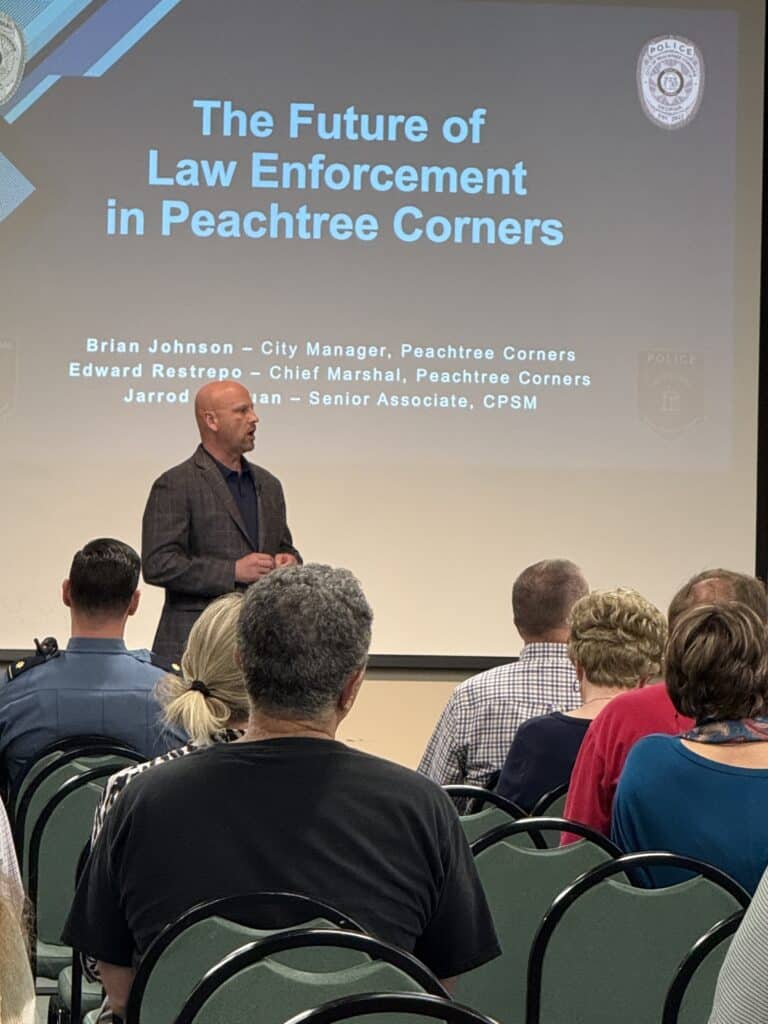
He added that the GCPD has video cameras on certain roadways that are used for various reasons, and law enforcement can use them when there’s crime in the area. Peachtree Corners marshals were denied access to those cameras.
“Conversely, we have a couple hundred cameras in the city, and we definitely want them to have access to them,” said Johnson. “So the frustration out of not being able to get that symbiosis between the marshals and police made us start thinking, all right, you know, is there another option?”
Community feedback
CPSM utilized data from GCPD to discern if Peachtree Corners could feasibly stand its own force. It also took into consideration crime trends, costs and many other factors. It recommended a 55-officer department, costing $12.1 million annually, with a $2.2 million upfront cost.
Comparing the two options to “renting vs. owning” the primary law enforcement agency in the city, Johnson presented pros and cons for each. Once the question-and-answer portion began, there was no obvious choice. Men and women, young and more advanced in age, had both similar and differing opinions.
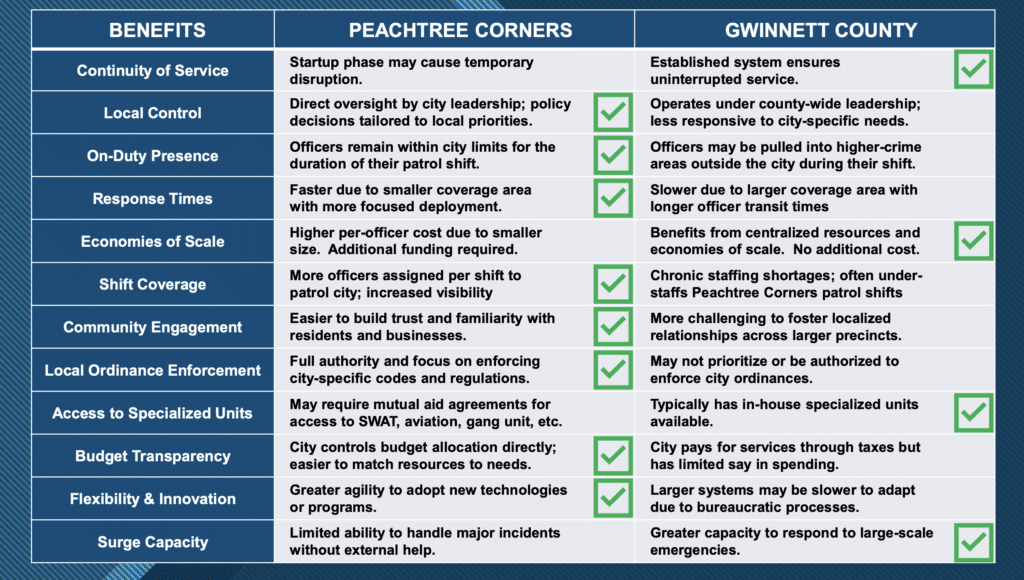
One young man, who identified himself as a local small business owner named Alexander, argued that with artificial intelligence increasing the efficiency of administrative tasks, perhaps the city wouldn’t need a full 68-man department of civilians and sworn officers.
Some accused the city of devising a solution in need of a problem. Others were concerned that paying approximately $100,00 for a study was throwing good money after bad.
But at the end of it all, the city is continuing to seek feedback and is encouraging everyone to make informed decisions. The meeting was taped and is available on the city website along with Johnson’s PowerPoint presentation, a copy of the study done by CPSM and a survey.
As far as a timeline goes, city officials would like folks to take the summer to mull it over and come back in the fall to take another look at the proposal.
Related
City Government
City of Peachtree Corners Awarded Certificate of Achievement From GFOA for Seventh Straight Year
Published
5 days agoon
May 9, 2025
The City of Peachtree Corners’ finance department has been awarded a Certificate of Achievement for Excellence in Financial Reporting from the Government Finance Officers Association of the United States and Canada (GFOA) for its 2024 financial year-end comprehensive annual financial report (CAFR).
The GFOA’s Certificate of Achievement is the highest form of recognition in governmental accounting and financial reporting, and its attainment represents a significant accomplishment by a government and its management.
It is the city’s seventh year of receiving the award and represents a significant accomplishment by the city’s finance department and its leadership.
According to a GFOA release, “The report has been judged by an impartial panel to meet the high standards of the program, which includes demonstrating a constructive ‘spirit of full disclosure’ to clearly communicate its financial story and motivate potential users and user groups to read the report.”
“We are pleased to again receive this honor,” said City Manager Brian Johnson. “Our finance department, and Finance Director Cory Salley, are to be commended for this achievement, as it is the highest form of recognition GOFA presents.”
A comprehensive annual report
The city’s finance department produces the CAFR each year and works with independent auditors to verify the city’s financial situation and standing.
“This prestigious award affirms Peachtree Corners’ dedication to exceeding basic requirements by producing comprehensive annual financial reports that reflect a strong commitment to transparency and full disclosure,” said Assistant City Manager Brandon Branham.
About the GFOA
The Government Finance Officers Association (GFOA), founded in 1906, represents public finance officials throughout the United States and Canada.
The association’s more than 20,000 members are federal, state/provincial and local finance officials deeply involved in planning, financing and implementing thousands of governmental operations in each of their jurisdictions. GFOA’s mission is to advance excellence in public finance.
To learn more about the GFOA, visit gfoa.org.
For more about the City of Peachtree Corners, visit peachtreecornersga.gov.
Related
City Government
The Future of Law Enforcement in Peachtree Corners: Community Meeting
Published
4 weeks agoon
April 14, 2025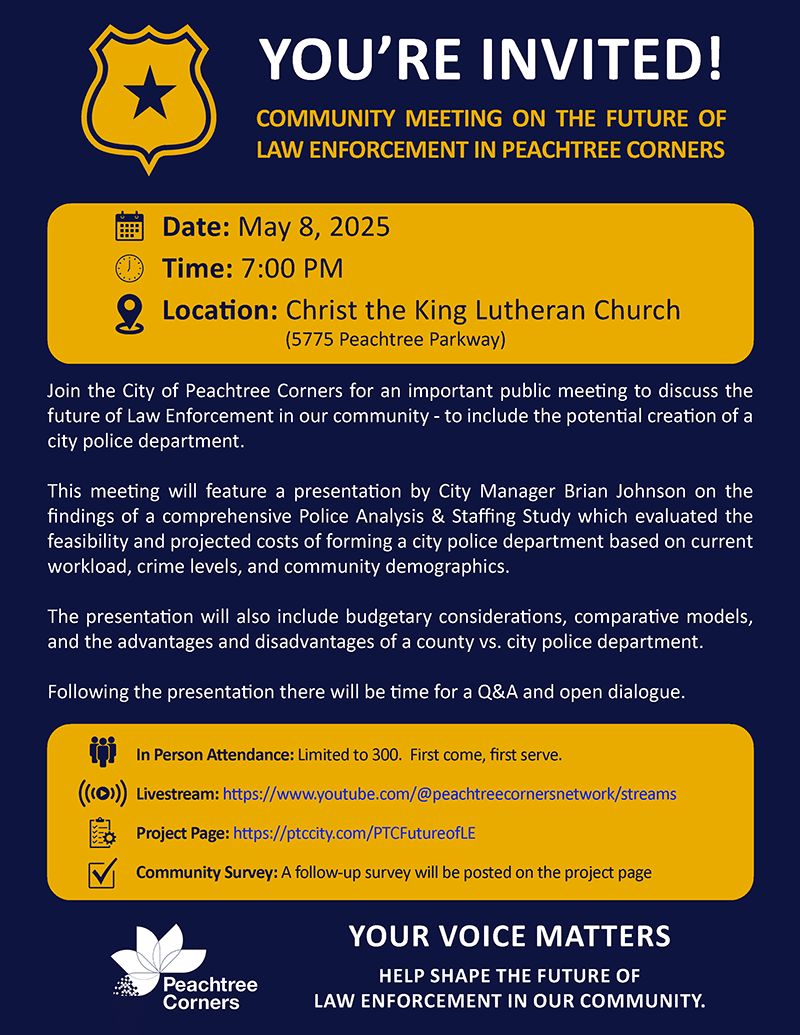
The City of Peachtree Corners will hold an important public meeting on May 8 to discuss the future of law enforcement in our community — including the potential creation of a city police department.
This meeting will feature a presentation by City Manager Brian Johnson on the findings of a comprehensive Police Analysis & Staffing Study that evaluated the feasibility and projected costs of forming a city police department based on current workload, crime levels and community demographics.
The presentation will also include budgetary considerations, comparative models and the advantages and disadvantages of a county vs. city police department.
Following the presentation, there will be time for a Q&A and open dialogue.
In-person attendance is limited to 300. First come, first served. A livestream option will be available for those who can’t attend in person.
After the meeting, a follow-up survey will be available on the city’s project page.
Meeting details
The Future of Law Enforcement in Peachtree Corners
Date/Time: May 8, 2025 at 7 p.m.
Location: Christ the King Lutheran Church (5775 Peachtree Parkway)
For more information, visit peachtreecornersga.gov.
Related
Read the Digital Edition
Subscribe
Keep Up With Peachtree Corners News
Join our mailing list to receive the latest news and updates from our team.
You have Successfully Subscribed!

Digital Edition

PCBA Announces 2025 Scholarship Winner

Official City Merchandise Line Debuts This Saturday at Town Green

Paul Duke STEM High School Student Earns CGO Scholarship

World Blood Donor Day Starts Here: Theo’s Miracle, Katherine’s Mission [Podcast]

Executive Function: A Tribute to Working Moms

Peachtree Corners Grows Business Opportunities Through Economic Development

Simpson Elementary Marks Exceptional Children’s Week

D1 Training Brings New Fitness Concept to Peachtree Corners

Peachtree Corners Hosts Discussion About the Future of Local Policing

City of Peachtree Corners Awarded Certificate of Achievement From GFOA for Seventh Straight Year

Simpson Elementary Marks Exceptional Children’s Week

Executive Function: A Tribute to Working Moms

Official City Merchandise Line Debuts This Saturday at Town Green

Peachtree Corners Grows Business Opportunities Through Economic Development

Digital Edition

Light up the Corners [Video]

Capitalist Sage: Business Leadership in Your Community [Podcast]

Cliff Bramble: A Culinary Adventure through Italy

Top 10 Brunch Places in Gwinnett County

A Hunger for Hospitality

THE CORNERS EPISODE 3 – BLAXICAN PART 1

Top 10 Indoor Things To Do This Winter

The ED Hour: What it takes to Remove Barriers from Education







